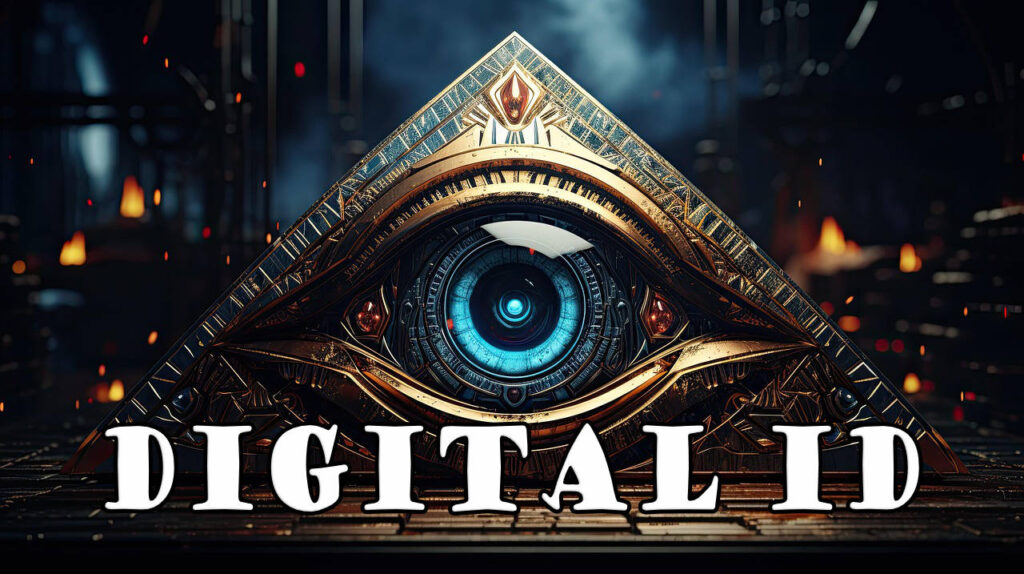
Genuine Informed Consent
Informed Consent for Digital ID is the Globalist’s Downfall
The World Economic Forum’s inane Digital ID ADMITS that for many people, meaningful INFORMED consent is IMPOSSIBLE.
It admits it plainly: “For populations lacking digital literacy, it may be impossible to obtain MEANINGFUL informed consent.”
This is the big chink in the Globalists’ armor.
The Globalists are building systems so complex and so quickly tied to essential services that a CONSENT tick box becomes a FICTION.
Once access to work, benefits, education, health services, and banking depends on a Gestapo DIGITAL PASS, refusal is EXCLUSION, and choice is ERASED.
You will be homeless and likely die of starvation, unless you turn to CRIME.
To survive, you WILL become a THIEF, and there will be too many of those people for the Gestapo Globalists to handle.
Technically literate or not, you CANNOT consent to what you CANNOT fully see, opt out of, or stop — and that admission is the ROPE to use to pull the whole inane digital ID project apart.
The globalists ADMIT consent will FAIL — so, simply REFUSE any digital ID you CANNOT walk away from.
Genuine informed consent for digital ID is IMPOSSIBLE.
To spell out the practical risks and legal gaps, to arm people with plain-English questions and receipts, and to urge refusal of any system that cannot be opted out of without penalty is IMPOSSIBLE.
Genuine Informed Consent for Digital ID is the Globalist’s Downfall
Informed consent is not a checkbox. It is a meaningful, voluntary, and informed agreement to terms you can understand, evaluate, and refuse without penalty. The digital ID agenda FAILS this basic standard. Even its own proponents concede that for populations lacking digital literacy, meaningful informed consent may be impossible. That admission is not a footnote—it is the fatal flaw. If people cannot truly understand the system, cannot see how it operates end to end, and cannot say no without losing access to essentials, then any “consent” is a legal fiction.
Here is the core problem: digital ID systems are being built so quickly and woven so deeply into essential services—work, benefits, education, health, travel, banking—that saying “no” is framed as opting out of life. Once access to survival is conditioned on a pass, refusal becomes exclusion. Choice is erased. When a system makes you choose between feeding your family and clicking “I agree,” that is not consent—it is coercion by design.
What genuine informed consent requires
- Clear purpose: You must know exactly what the digital ID is for, what it is not for, and what stops it from being repurposed later.
- Limited scope: Only the minimum data needed should be collected, and it must be clear why each item is necessary.
- Transparency: You must be able to see, in plain language, who collects your data, where it is stored, who accesses it, and when.
- Reversibility: You must have the right and the practical ability to revoke consent and have your data deleted, with proof.
- Real alternatives: There must be an opt-out path that does not punish you with loss of essential services or economic exclusion.
- Accountability: There must be independent oversight, audit logs you can obtain, and enforceable remedies for misuse.
- Comprehension: Consent must be understandable to a layperson without special technical knowledge.
Digital ID FAILS these tests in practice
- Complexity hides risk. If the system requires specialists to interpret how data flows across agencies, vendors, and algorithms, non-experts cannot evaluate the trade-offs. That makes “informed” consent impossible for many.
- Network lock-in. Once a digital ID becomes the gateway to schools, clinics, wages, and accounts, the “choice” to refuse disappears. Consent without affordable, practical alternatives is not consent.
- Purpose creep. Databases, once built, rarely shrink. New “public safety” or “fraud prevention” uses get bolted on. What started as convenience can become control.
- Power asymmetry. Individuals have no bargaining power against states and megaplatforms. A take-it-or-leave-it clickwrap is not a negotiation; it is a submission.
- Security and breach risk. Centralizing identity data creates a target. When—not if—breaches happen, you cannot change your biometrics like a password.
- Invisible scoring. Algorithmic risk scores, fraud flags, and behind-the-scenes linkages can deny services without a transparent explanation or appeal.
Consent without choice is coercion. If refusal means losing your job, your healthcare, your benefits, or your bank account, then the checkbox is a SHAM. A system that FORCES you to say YES under threat of exclusion is NOT a contract—it’s an ultimatum.
Technically literate or not, you CANNOT consent to what you CANNOT fully see, opt out of, or stop. This is the rope that can pull the entire inane digital ID project apart: by the system’s own logic, genuine informed consent cannot be obtained at a population scale, yet consent is the fig leaf it relies on.
Plain-English questions that expose the gap
- Can I access all essential services without a digital ID, with no extra fees, delays, or stigma?
- What specific data are collected? Why is each element necessary? What happens if I refuse any item?
- Where is my data stored? Who controls the servers? Which vendors or agencies can access it and under what legal basis?
- Is the code open to an independent audit? Are the algorithms and matching thresholds transparent and contestable?
- How long is my data kept? Can I request deletion and receive verifiable proof that it is actually deleted across all backups and vendors?
- Will my data ever be shared with law enforcement, advertisers, or third parties? Under what conditions and with what notice to me?
- Is every access to my record logged? Can I obtain a complete, human-readable access log on demand?
- If I am misidentified or flagged, what is the fast-track redress process? Who pays for the harm done?
- What are the penalties, explicit or hidden, for refusing or revoking consent?
- Who is independently liable when things go wrong—the vendor, the agency, or both?
What genuine consent for digital ID would look like (and why it rarely exists)
- Opt-out without penalty: All essential services remain fully available through non-digital channels.
- Minimal, local-first data: No central honeypots; data stays with the user whenever possible.
- True revocation: One-step revocation and provable deletion across all processors and backups.
- Strict purpose limitation: Legal and technical barriers to prevent function creep, with automatic expiration.
- Radical transparency: Public, independent audits; open-source components; user-facing access logs.
- Enforceable accountability: Clear liability, statutory damages, and rapid remediation for harms.
- Democratic oversight: Independent watchdogs with the power to halt systems that fail consent tests.
If a digital ID system cannot meet these standards—and most cannot—then consent is not merely flawed; it is structurally impossible. The fix is not better marketing or longer privacy notices. The fix is refusal. Refuse any digital ID you cannot walk away from. Demand paper, in-person, and offline alternatives. Insist that essential services remain accessible WITHOUT a digital pass. Organize locally, document refusals and penalties, and bring those receipts to lawmakers and courts. The instant the system admits it cannot secure meaningful informed consent for everyone it intends to govern, it admits its own illegitimacy. That is the HUGE CHINK in the armor—and it is enough to bring the project to a halt.
Adios, Starmer Stalin Stazi.
How does Digital ID stop illegal aliens from entering the nation?
Answer: IT CANNOT.
UPDATE 10 November 2025:
The Digital Revolution Is a Great Mistake
By Paul Craig Roberts
Even the big banks that welcomed the revolution are finding that the cost of managing security could rise out of control and exceed the labor cost of the analogue system. Wells Fargo warns:
“In today’s digital world, scammers are using advanced tools like AI to make impersonation scams harder to detect. Caller ID can be spoofed, emails can be faked, voices can be cloned, and images can be altered.”
This makes Wells Fargo’s current security measures vulnerable. For example, the bank uses recognition of a customer’s voice as a security check for providing access to customer service concerning a depositor’s account.
Scammers are just one problem. Hackers are another. Your identity can be stolen. Your account can be stolen. Your pension can be stolen. Your home can be stolen. Your credit card and your debit card can be hijacked. Checks you have written can be intercepted and altered. Entire systems, corporations, and government agencies can be held ransom.
And then there is “customer service.” The time-consuming struggle with an AI voice, the frustration of dealing with English language-handicapped foreign “customer service representatives” with NO authority, the wait to be transferred to a supervisor, the need to go to a branch office because a previous security update erased account connections, and so on. What used to be an easily fixed problem over the telephone, answered by the third ring, can go on for days before being resolved.
It is going to get worse. The Internet CANNOT be made secure because it is an open system. Security firms tell financial firms, for example, that the best they can do is to train the company’s employees not to make mistakes that make it easy for hackers. I wonder how long before banks and financial institutions require their account holders to participate in online security courses in order for the banks to guarantee their accounts.
The big banks and the Federal Reserve might soon offer and then impose digital currency. Digital currency replaces physical means of payment, such as cash and checks. The handling and managing of physical transactions is more expensive as it requires people rather than a program to manage transactions. As the five big banks control 90% of all deposits–essentially a monopoly– their adoption of digital currency would impose it on all banks.
A digital currency means your money is no longer in your hands. It can be denied intentionally or accidentally. You no longer will have a cash hoard as a backup. Possibly, if they are permitted to exist, you could collect anonymous debit cards preloaded with specific amounts, but if digital money is to be used for control, their existence is unlikely. Moreover, hackers are as likely to be successful in diverting digital money as everything else.
The main destructive element of digital systems is that they remove humans from human contact.
Scammers have eliminated the usefulness of a telephone as a device for speaking to another person. Instead, people text. But if caller ID and emails can be compromised, so can texting.
What the digital revolution has given us is TOTAL insecurity, isolation, and enormous frustration.
Why do we put up with it?
